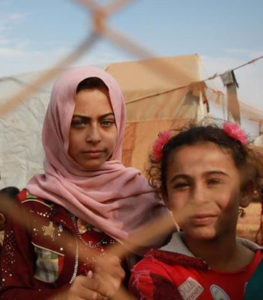Global refugee resettlement plunges
The number of refugees resettled in safe third countries will hit a record low in 2020, the UN refugee agency (UNHCR) has warned, as it urges Australia and other refugee accepting countries to restart their programs.
According to the latest data from the UNHCR, as at the end September, only 15,425 refugees have been resettled globally, compared with 63,726 in 2019, 55,680 in 2018, 65,108 in 2017 and 126,291 in 2016.
 The UNHCR has urged states to resettle as many refugees as possible in 2020 in order not to lose those resettlement opportunities for refugees, and to maintain resettlement quotas for 2021.
The UNHCR has urged states to resettle as many refugees as possible in 2020 in order not to lose those resettlement opportunities for refugees, and to maintain resettlement quotas for 2021.
The agency estimates that, primarily due to the impact of COVID-19 on resettlement processing and travel, as many as 15,000 resettlement places will be lost in 2020.
Despite the impact of the pandemic, UNHCR resettlement operations have been working to identify and process cases throughout the year, submitting resettlement files for more than 31,000 refugees.
Of the refugees that were resettled this year, Syrians comprised the bulk, with 41 per cent, followed by Congolese, 16 per cent. Others were from 47 countries of origin, including Afghanistan, Iraq and Myanmar.
UNHCR’s assistant high commissioner for protection and former Australian Human Rights Commissioner Gillian Triggs said: “We are dealing with a disappointingly low resettlement ceiling to begin with – a quota of less than 50,000 for the entire year – and this was further impacted by Covid-19 delaying departures and pausing some states’ resettlement programs”.
“Current rates point to one of the lowest levels of resettlement witnessed in almost two decades. This is a blow for refugee protection and for the ability to save lives and protect those most at risk,” Prof Triggs said.
“Expanding safe and legal pathways to protection, including through resettlement, saves refugees’ lives and it can also mitigate their resort to dangerous journeys by land or sea,” she said.
Even before the COVID pandemic, less than five per cent of refugees needing resettlement were find new homes despite record levels of worldwide forced human displacement, new figures from the UNHCR show.
The data shows just 4.7 per cent of global refugee resettlement needs were met in 2018 under UNHCR-facilitated resettlement departures.
It shows that of the estimated 1.2 million UNHCR-registered refugees in need of immediate resettlement in 2018, only 55,692 were actually resettled.
The largest number of resettlement departures were from major refugee-hosting countries, including Lebanon (9,800), followed by Turkey (9,000), Jordan (5,100) and Uganda (4,000).
Out of a total of 81,310 referrals, the largest number of referred refugees are from the Syrian Arab Republic (28,200), the Democratic Republic of the Congo (21,800), Eritrea (4,300) and Afghanistan (4,000).
Sixty-eight per cent of submissions last year were from survivors of violence and torture, those with legal and physical protection needs, and women and girls at risk. More than half, 52 per cent, of all resettlement submissions in 2018 were for children.
Resettlement, which involves the relocation of refugees from a country of asylum to a country that has agreed to admit them and grant them permanent settlement, is available only to a fraction of the world’s refugees.
Typically, less than one per cent of the 19.9 million refugees worldwide under UNHCR’s mandate are ever resettled.
The UNHCR says resettlement is largely a life-saving tool to ensure the protection of people most at risk.
Resettlement and other complementary pathways for admission, is a key objective of the Global Compact on Refugees, to help reduce the impact of large refugee situations on host countries.












